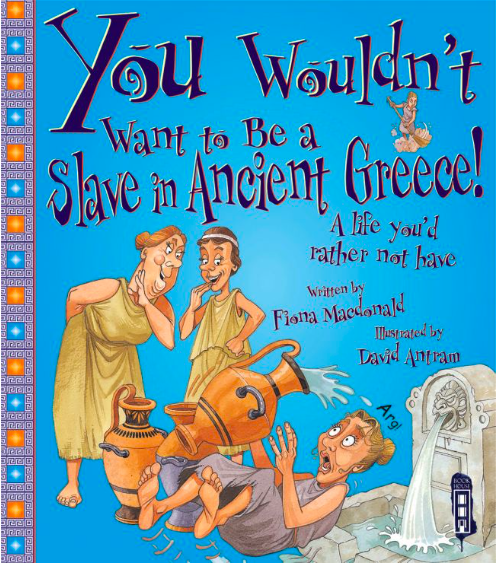Title of the work
Country of the First Edition
Country/countries of popularity
Original Language
First Edition Date
First Edition Details
Fiona MacDonald, ill. Dave Antram, You Wouldn’t Want to Be a Slave in Ancient Greece!: A Life You'd Rather Not Have. London: Hodder Wayland, 2001, 32 pp.
ISBN
Genre
Historical fiction
Humor
Illustrated works
Instructional and educational works
Picture books
Target Audience
Children
Cover

Courtesy of The Salariya Book Company.
Author of the Entry:
Viktoryia Bartsevich, University of Warsaw, v.bartsevich@student.uw.edu.pl
Peer-reviewer of the Entry:
Elżbieta Olechowska, University of Warsaw, elzbieta.olechowska@gmail.com
Elizabeth Hale, University of New England, ehale@une.edu.au

David Antram
, b. 1958
(Illustrator)
David Antram was born in 1958 in Brighton, England. He studied at Eastbourne College of Art. He has illustrated over 100 titles, mainly for children and young adults, including around 60 in the bestselling You Wouldn't Want to Be series. David Antram illustrated You Wouldn’t Want to Live Without Toilets by Fiona MacDonald and David Salariya, You Wouldn’t Want to Live Without Antibiotics by David Salariya, How to Be an Ancient Greek Athlete by Jacqueline Morley. All the aforementioned examples fall into the category of children's literature.
Sources:
The cover of You Wouldn’t Want to be a Slave in Ancient Greece!: A Life You'd Rather Not Have.
Profile at the jacketflap.com (accessed: July 4, 2017).
Bio prepared by Viktoryia Bartsevich, University of Warsaw, v.bartsevich@student.uw.edu.pl

Fiona MacDonald
, b. 1958
(Author)
Fiona MacDonald studied history at Cambridge and at the University of East Anglia. She authored over a hundred books for young people, among which are many fantasy series, such as The Danger Zone, Top 10 Worst and A Very Peculiar History. Fiona MacDonald also wrote You Wouldn’t Want to Be a Medieval Knight!: Armor You’d Rather Not Wear, Jane Eyre: A Graphic Novel, A Medieval Castle, The Odyssey, Heroes, Gods and Monsters of Celtic Mythology. All these examples fall into the category of children's literature.
Sources:
Biography based on the cover of You Wouldn’t Want to be a Slave in Ancient Greece!: A Life You'd Rather Not Have and Author's profile on Biblio.com (accessed September 17, 2017).
Bio prepared by Viktoryia Bartsevich, University of Warsaw, v.bartsevich@student.uw.edu.pl

David Salariya
, b. 1954
(Illustrator)
David Salariya was born in 1954 in Dundee, Scotland. He is the founder of Salariya Book Company. David Salariya is an illustrator. His first illustration was done for Reader’s Digest.
Source:
Interview at the creativeinterviews.com (accessed: April 17, 2018).
Interview at the childrensillustrators.com (accessed: April 17, 2018).
Bio prepared by Elżbieta Olechowska, University of Warsaw, elzbieta.olechowska@gmail.com and Viktoryia Bartsevich, University of Warsaw, v.bartsevich@student.uw.edu.pl
Translation
Polish: Nie chciałbyś być niewolnikiem w starożytnej Grecji! Życie, jakiego nie chciałbyś wieść, trans. Janusz Ochab, Warszawa: Firma Księgarska Jacek i Krzysztof Olesiejuk Inwestycje, 2005.
Summary
The narrator talks about the life of slaves. Abandoned children, failed debtors and defeated soldiers captured by their victors can become slaves. All who do not speak Greek are considered barbarians.
When a man becomes a slave, he loses his family, he will probably never see them again. The book describes the various kinds of work that a slave may perform. These include, but are not limited to cooking, cleaning, child care, wool work, lifting and carrying.
There are good owners who treat their slaves like their friends and not their possessions. They may also allow a slave to keep a couple of coins from his or her earnings to eventually save enough money to buy his or her freedom and try to return to their past life. If a slave has been sent for fight by the owner, then a brave fight may also gain him his freedom.
The book is supplemented with valuable advice for someone who becomes a slave, for example, if he has talents, it would be good to tell the owner about them, it could increase his importance as a slave; there is also advice on cooking and cleaning. The slave should try to avoid harvesting wood, because it is the hardest work; the slave should not go shopping for grain when it rains, because the seed under the rain gets wet and becomes heavier, forcing the slave to pay more.
Analysis
The entire series “You wouldn’t want to be…” created by David Salariya consists of text and complementary illustrations which are more important than the text. They are colorful and pleasant, sometimes even amusing. In the margins there are comments explaining concepts and facts. Each book in the series contains a glossary and a character index. In this volume of the series, types of slaves and the range of their responsibilities are described. The authors also give tips on how to survive in different conditions. A certain air of a self-help book adds not only information but also humour.
Reading reads to the young reader about the subject of slavery in Ancient Greece. It contains a lot of curiosities. Although they are difficult topics in the book, it is built in a fun atmosphere.
Addenda
Entry based on: Fiona MacDonald, You Wouldn’t Want to be a Slave in Ancient Greece!: A Life You'd Rather Not Have, ill. Dave Antram, created and designed by David Salariya. Brighton: Salariya Book Company Book House, revised edition, 2014, 32 pp.


